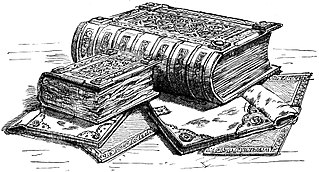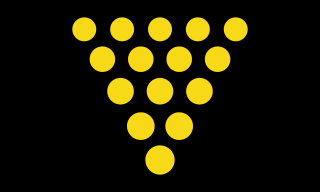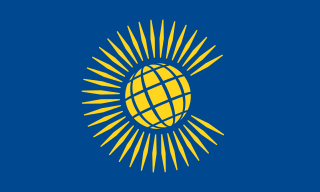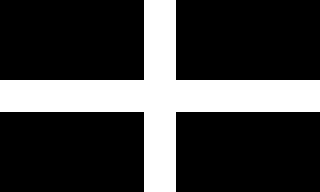
Domesday Book is a manuscript record of the "Great Survey" of much of England and parts of Wales completed in 1086 by order of King William the Conqueror. The Anglo-Saxon Chronicle states:
Then, at the midwinter [1085], was the king in Gloucester with his council .... After this had the king a large meeting, and very deep consultation with his council, about this land; how it was occupied, and by what sort of men. Then sent he his men over all England into each shire; commissioning them to find out "How many hundreds of hides were in the shire, what land the king himself had, and what stock upon the land; or, what dues he ought to have by the year from the shire."

Duke of Cornwall is a title in the Peerage of England, traditionally held by the eldest son of the reigning British monarch, previously the English monarch. The Duchy of Cornwall was the first duchy created in England and was established by a royal charter in 1337. The present duke is the Prince of Wales, the eldest son of Queen Elizabeth II. His current wife, Camilla, is the current Duchess of Cornwall.

The Cabinet of the United Kingdom is a group in the government of the United Kingdom, consisting of the highest ranking ministers of the Crown. A committee of the Privy Council, its members include the holders of the four Great Offices of State, including the prime minister, who chairs the Cabinet. Other members include the principal secretaries of state who each head the government departments.
Escheat is a common law doctrine that transfers the real property of a person who has died without heirs to the Crown or state. It serves to ensure that property is not left in "limbo" without recognized ownership. It originally applied to a number of situations where a legal interest in land was destroyed by operation of law, so that the ownership of the land reverted to the immediately superior feudal lord.

Land reform involves the changing of laws, regulations or customs regarding land ownership. Land reform may consist of a government-initiated or government-backed property redistribution, generally of agricultural land. Land reform can, therefore, refer to transfer of ownership from the more powerful to the less powerful, such as from a relatively small number of wealthy owners with extensive land holdings to individual ownership by those who work the land. Such transfers of ownership may be with or without compensation; compensation may vary from token amounts to the full value of the land.

The Crown is the state in all its aspects within the jurisprudence of the Commonwealth realms and their subdivisions. Legally ill-defined, the term has different meanings depending on context. It is used to designate the monarch in either a personal capacity, as Head of the Commonwealth, or as the king or queen of his or her realms. It can also refer to the rule of law; however, in common parlance 'The Crown' refers to the functions of government and the civil service.
Cornwall is a Celtic nation and a county of England. Strengthened by a series of 20th century revivals, traditional folk music has a popular following. It is accompanied by traditions of brass and silver bands, male voice choirs, classical, electronic and popular music.

Lord of the manor is a title that, in Anglo-Saxon England, referred to the landholder of a rural estate. The lord enjoyed manorial rights as well as seignory, the right to grant or draw benefit from the remainder. The title continues in modern England and Wales as a legally recognised form of property that can be held independently of its historical rights. It may belong entirely to one person or be a moiety shared with other people.

In common law systems, land tenure is the legal regime in which land is owned by an individual, who is said to "hold" the land. It determines who can use land, for how long and under what conditions. Tenure may be based both on official laws and policies, and on informal customs. In other words, land tenure system implies a system according to which land is held by an individual or the actual tiller of the land. It determines the owners rights and responsibilities in connection with their holding. The French verb "tenir" means "to hold" and "tenant" is the present participle of "tenir". The sovereign monarch, known as The Crown, held land in its own right. All private owners are either its tenants or sub-tenants. Tenure signifies the relationship between tenant and lord, not the relationship between tenant and land. Over history, many different forms of land ownership, i.e., ways of owning land, have been established.
Allodial title constitutes ownership of real property that is independent of any superior landlord. Allodial title is related to the concept of land held "in allodium", or land ownership by occupancy and defense of the land. Historically, much of land was uninhabited and could, therefore, be held "in allodium".

The constitutional status of Cornwall has been a matter of debate and dispute. In modern times, Cornwall is an administrative county of England.

Michael Anthony Ashcroft, Baron Ashcroft, is a British–Belizean businessman, pollster and politician. He is a former deputy chairman of the Conservative Party. Ashcroft founded Michael A. Ashcroft Associates in 1972 and is the 95th richest person in the UK, as ranked by the Sunday Times Rich List 2017, with an estimated fortune of £1.35 billion.

Quia Emptores is a statute passed by the Parliament of England in 1290 during the reign of Edward I that prevented tenants from alienating their lands to others by subinfeudation, instead requiring all tenants who wished to alienate their land to do so by substitution. The statute, along with its companion statute Quo Warranto also passed in 1290, was intended to remedy land ownership disputes and consequent financial difficulties that had resulted from the decline of the traditional feudal system in England during the High Middle Ages. The name Quia Emptores derives from the first two words of the statute in its original mediaeval Latin, which can be translated as "because the buyers". Its long title is A Statute of our Lord The King, concerning the Selling and Buying of Land. It is also cited as the Statute of Westminster III, one of many English and British statutes with that title.
Unowned property refers to tangible, physical things which are capable of being reduced to being property owned by an individual but are not owned by anyone. Bona vacantia is a legal concept associated with the unowned property, which exists in various jurisdictions, with a consequently varying application, but with origins mostly in English law.

An overlord in the English feudal system was a lord of a manor who had subinfeudated a particular manor, estate or fee, to a tenant. The tenant thenceforth owed to the overlord one of a variety of services, usually military service or serjeanty, depending on which form of tenure the estate was held under. The highest overlord of all, or paramount lord, was the monarch, who due to his ancestor William the Conqueror's personal conquest of the Kingdom of England, owned by inheritance from him all the land in England under allodial title and had no superior overlord, "holding from God and his sword", although certain monarchs, notably King John (1199–1216) purported to grant the Kingdom of England to Pope Innocent III, who would thus have become overlord to English monarchs.
In the law of the Middle Ages and early Modern Period and especially within the Holy Roman Empire, an allod, also allodial land or allodium, is an estate in land over which the allodial landowner (allodiary) had full ownership and right of alienation.
The Manor of Alverton was a former manorial estate located in the hundred of Penwith, west Cornwall, England, UK.

Cornish nationalism is a cultural, political and social movement that seeks the recognition of Cornwall – the south-westernmost part of the island of Great Britain – as a nation distinct from England. It is usually based on three general arguments:
Even before the Norman Conquest, there was a strong tradition of landholding in Anglo-Saxon law. When William the Conqueror asserted sovereignty over England in 1066, he confiscated the property of the recalcitrant English landowners. Over the next dozen years, he granted land to his lords and to the dispossessed Englishmen, or affirmed their existing land holdings, in exchange for fealty and promises of military and other services. At the time of the Domesday Book, all land in England was held by someone, and from that time there has been no allodial land in England. In order to legitimise the notion of the Crown's paramount lordship, a legal fiction - that all land titles were held by the King's subjects as a result of a royal grant - was adopted.
In the Commonwealth realms, Queen's Consent is required for the legislature to be able to debate a bill affecting the prerogatives or the interests of the relevant crown. In the United Kingdom, this extends to matters affecting the Duchy of Lancaster and the Duchy of Cornwall; for the latter, Prince's Consent must also be obtained. The Scottish Parliament adheres to the same requirement of consent.










